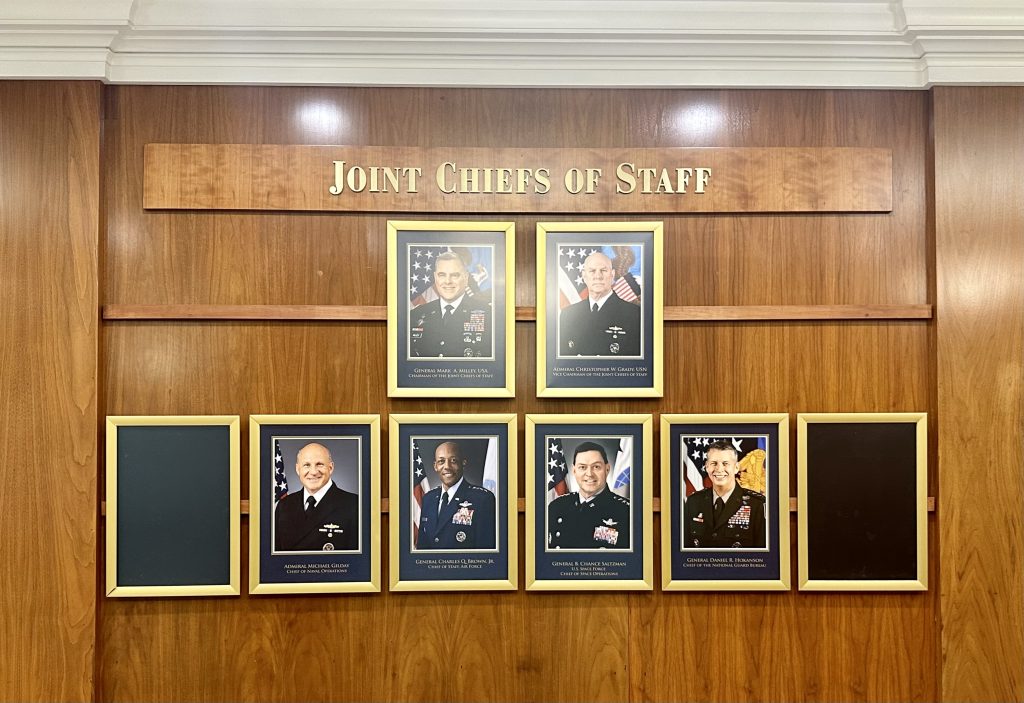With the retirement of Army Chief of Staff Gen. James C. McConville on Aug. 4, two positions on the Joint Chiefs of Staff do not have a Senate-confirmed replacement, and more than 300 general and flag officer nominations remain in limbo while Sen. Tommy Tuberville (R-Ala.) continues to protest the Department of Defense’s reproductive health policies with a legislative hold.
As of Aug. 8, Tuberville’s hold on unanimous consent confirmation for general and flag officers is affecting 301 nominations pending before the Senate. More than a third of those affected officers are from the Air Force and Space Force.
According to Pentagon data, 73 pending nominations are from the Air Force, 25 for the Air Force Reserve, and eight for the Space Force—106 total. The Department of Air Force says nearly two dozen are for three-and-four star positions.
Some generals actually have two separate nominations pending. Brig. Gen. Dale R. White has been nominated to move up two ranks, and Air Force Maj. Gen. Shawn Bratton has been nominated for a third star and to become deputy chief of space operations for strategy, plans, programs, and requirements, meaning he must transfer from two-star Airman to two-star Guardian, then be promoted.
At the moment, however, they’re stuck waiting, and with the Senate out of session until September, a resolution is still weeks away at best.
In the meantime, most officials have to stay in place. For example, Air Force major commands, such as Air Combat Command and Pacific Air Forces, are in limbo. Gen. Kenneth D. Wilsbach, the current head of PACAF, has been nominated to head ACC. But he cannot replace Gen. Mark D. Kelly until confirmed, forcing Kelly to stay on at ACC for now, without a clear timeframe on when the situation might be resolved.
“Largely speaking, if it's a Senate-confirmed position for example, three-to-four star, there would be a lot of situations where you would hold in place until you're confirmed, unless there's permission to act in an acting capacity,” Pentagon Press Secretary Air Force Brig. Gen. Patrick S. Ryder told reporters Aug. 7.
In high-profile positions on the Joint Chiefs of Staff, though, leaders are term-limited, leading to situations like McConville’s retirement without a confirmed successor.
McConville’s deputy, Gen. Randy A. George, has been nominated to succeed him but is now serving in an acting role. The Marine Corps is currently being led by assistant commandant Gen. Eric M. Smith on an acting basis—Smith has also been nominated to take over the top job but is still awaiting confirmation to replace now retired Gen. David H. Berger.
In the hallway of the Pentagon housing the Joint Chiefs of Staff, McConville's portrait was recently removed, joining the blank space vacated by Berger. Chief of Naval Operations Adm. Michael M. Gilday will retire later this month, leaving the Navy without a Senate-confirmed boss.

“Unfortunately, today, for the first time in the history of the Department of Defense, two of our services will be operating without Senate-confirmed leadership, and 301 nominations for our general and flag officers are being held up," Secretary of Defense Lloyd J. Austin III said Aug. 4 said McConville’s relinquishment of command ceremony. “Let me be clear: In our dangerous world, the security of the United States demands orderly and prompt transitions of our confirmed military leaders.”
At the end of September, Gen. Mark A. Milley’s term as Chairman of the Joint Chiefs will be up. Air Force Chief of Staff Gen. Charles Q. Brown Jr. has been nominated to replace Milley but must be approved by then. If he is not, then Vice Chairman Adm. Christopher W. Grady will step in on an acting basis.
Tuberville first placed a hold on all flag and general officer nominees in March, attempting to pressure the Pentagon into reversing its policy providing paid leave and travel funds for troops requiring reproductive services, including abortions, who are based in states where those services are not available.
Majority Leader Sen. Chuck Schumer (D-N.Y.) could bring up nominations for individual roll call votes in the Senate. But Democrats seem unwilling to take that step for now, arguing voting one-by-one would cost too much floor time.
“There is no world in which we can use floor time for these nominations,” Sen. Chris Murphy (D-Conn.) told reporters Aug. 8. “It’s logistically impossible to do these nominations through regular order.”
But while most military nominations are usually confirmed via unanimous consent, some of the most critical positions, such as service chiefs or Chairman of the Joint Chiefs, have received roll call votes in the past. Brown was confirmed to his current role in an uncontroversial, 98-0 roll call vote in 2020.
Tuberville’s hold has drawn the ire of some fellow Republicans, though Tuberville has been unmoved by pressure to change his position.
“Maybe Republicans were hopeful that leading up to the August break he would relent,” Murphy said of Tuberville. "He didn’t, and we now have to adjust our strategy.”
A spokesperson for Schumer did not immediately reply to a request for comment.
How things will play out when the Senate returns is unclear. Tuberville last spoke to Austin on July 18, their third phone call on the topic according to the Pentagon, but the short conversation did not help break the impasse. Pentagon officials say they continue to attempt to engage with Tuberville’s office. But Tuberville has so far indicated he does not intend to back down.
“I remain strongly opposed to this immoral policy, and believe its development and implementation run afoul of legal authority granted to the executive branch,” Tuberville wrote in a letter to Austin on July 28, reiterating that his hold remains in effect.
"The hold simply requires military nominations and promotions to be processed through regular order rather than being approved by unanimous consent in large batches,” Tuberville’s office said in a statement at the time.
